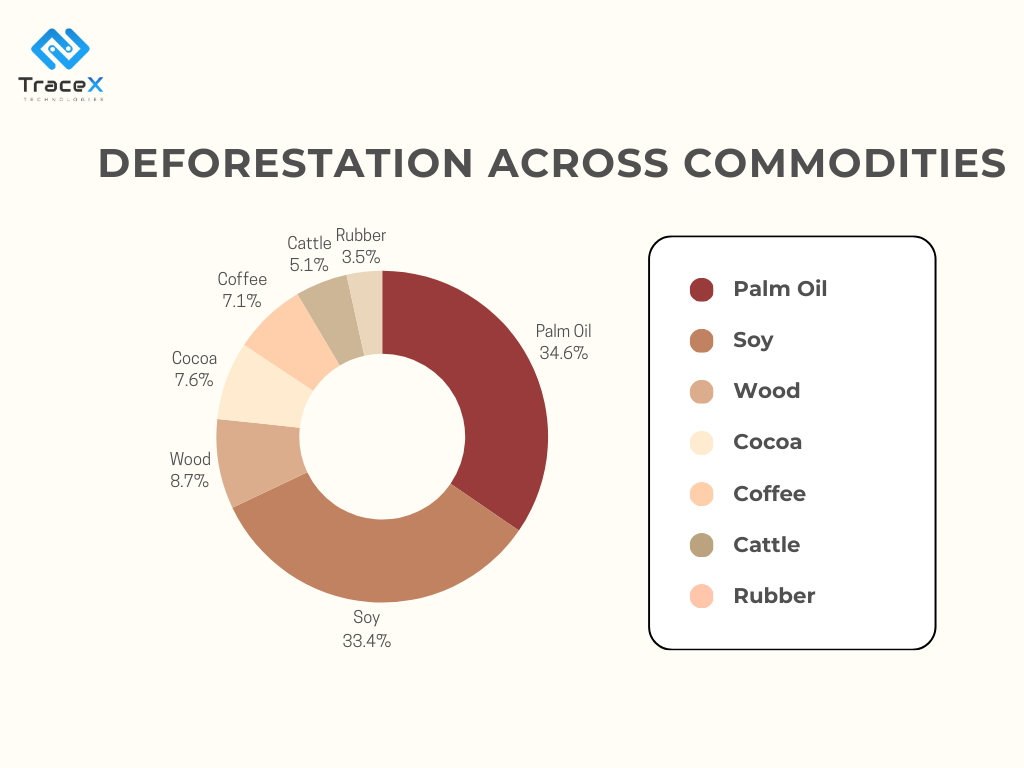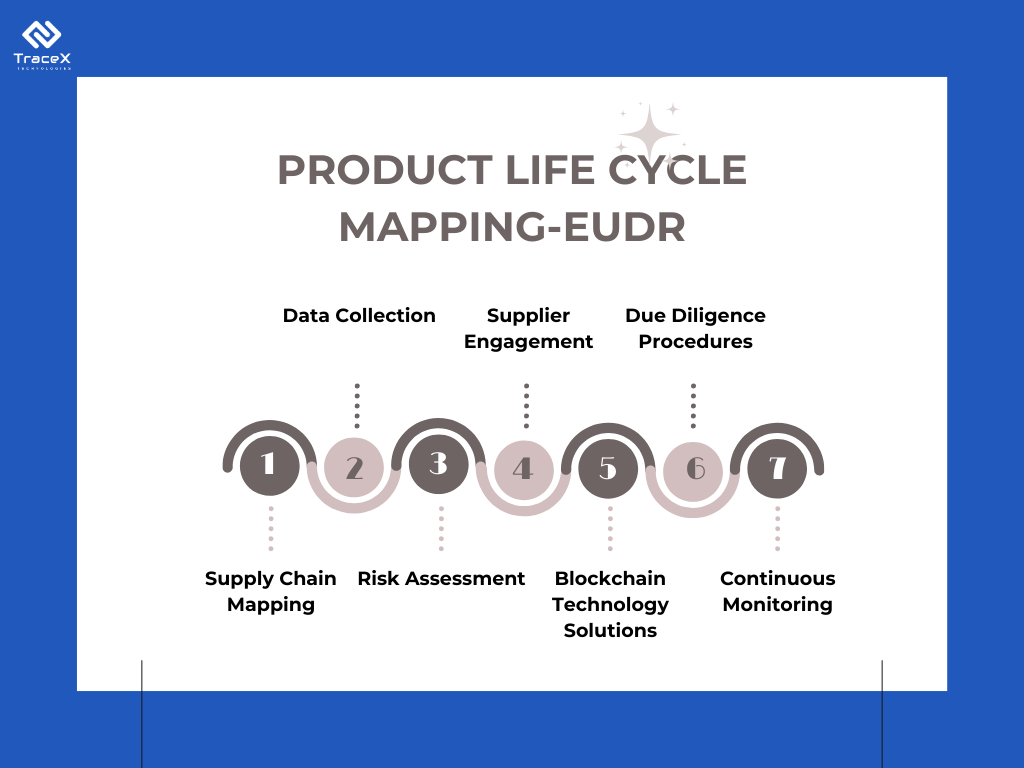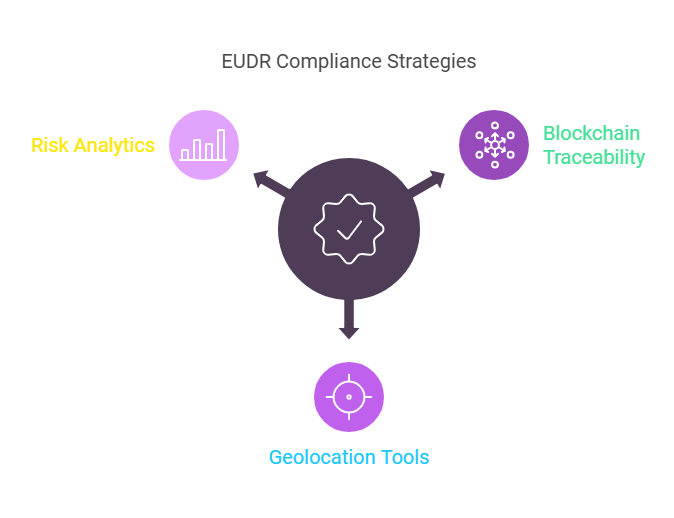Contact: +91 99725 24322 |
Menu
Menu
Quick summary: Discover how producer companies can implement EUDR compliance, streamline supply chain transparency, and meet EU market requirements with ease. Learn about key strategies and solutions for success.

As the European Union steps up its fight against deforestation, the pressure on producer companies to ensure EUDR compliance is mounting. If you’re in the business of producing soy, palm oil, beef, coffee, cocoa, rubber, or wood, the stakes are higher than ever. But with new regulations in place, how do you navigate the complexities of EUDR compliance for producer companies?
The EU’s consumption habits contribute to roughly 10% of global deforestation. Palm oil and soy are the biggest culprits, driving an estimated two-thirds (66.8%) of the deforestation linked to the EU market.
From mapping your supply chain to ensuring deforestation-free sourcing, the task can feel overwhelming, especially for companies with intricate global operations. Failing to comply not only risks penalties but also jeopardizes access to one of the world’s largest consumer markets—the EU. But with the right approach, you can turn these challenges into opportunities, reinforcing your commitment to sustainable practices while securing your place in the market.
The European Union Deforestation Regulation (EUDR), implemented in June 2023, is a game-changer for global supply chains. This regulation aims to eliminate deforestation and forest degradation from the production of key commodities entering the EU market.

The EU Deforestation Regulation (EUDR) cracks down on recent land conversion. If, after December 30th, 2020, producers convert forests into any type of agricultural land, planted forests, or even new plantations, their products are not considered compliant with the EUDR. This means these commodities cannot be sold in the European market.
For producer companies, especially those exporting to the EU, the EUDR brings both challenges and opportunities:
The EU’s demand for certain products is linked to deforestation around the world.
While the EUDR offers potential benefits, achieving compliance can be challenging for producer companies, particularly those with complex supply chains.
These challenges highlight the complexities producer companies face in achieving EUDR compliance. However, by adopting innovative solutions and seeking support, companies can overcome these hurdles and carve a path towards a sustainable future.
To successfully navigate EUDR compliance for producer companies, it’s important to take a structured, step-by-step approach. This will not only ensure you meet regulatory requirements but also streamline your processes for long-term sustainability.

The first step in your compliance journey is to map your supply chain. Identify every single supplier and intermediary involved in sourcing and handling your commodities, from farms to final products. This step is crucial because you need to know exactly where your materials are coming from to assess potential risks.
Once your supply chain is mapped, it’s time to evaluate the sourcing regions. Some areas may have higher deforestation risks due to agricultural practices or inadequate land use regulations. By understanding where your products are coming from, you can identify which regions need closer attention and action to ensure your supply chain is deforestation-free.
Review your current traceability infrastructure to identify any gaps. Does your current system capture essential data like geolocation and the deforestation status of your suppliers? Auditing your existing systems ensures you know what needs to be improved to meet EUDR’s stringent requirements.
Once you’ve assessed your supply chain and systems, the next step is to develop a compliance strategy. Set clear objectives, realistic timelines, and milestones to track progress. This will guide your company through the implementation process and keep everyone focused on meeting EUDR standards.
Adopting the right tools and technologies is essential to manage compliance. You should consider blockchain solutions for traceability, geolocation mapping for sourcing areas, and risk analytics tools to track and mitigate potential deforestation risks in real-time. These tools will give you the visibility and control you need to stay compliant.
EUDR compliance isn’t a solo effort—it involves your suppliers, farmers, and intermediaries. It’s vital to work closely with these stakeholders to ensure data transparency and encourage cooperation. By aligning everyone on the importance of EUDR and maintaining open lines of communication, you’ll ensure smoother implementation.
Now that you have your strategy and tools in place, it’s time to implement traceability systems. Integrate geolocation tools to track and verify your commodities’ origins and ensure they are deforestation-free. Implement a real-time monitoring system that gives you up-to-date insights on where your products are coming from.
To ensure your suppliers meet the compliance requirements, train them on what the EUDR entails and how they can implement the necessary changes. This training should cover everything from data-sharing practices to the importance of traceability in your supply chain.
The EUDR requires businesses to submit detailed reports to the EU, outlining their compliance. Set up reporting integration with EU platforms to make the submission process seamless. This will allow you to easily provide the required documentation on your traceability efforts and deforestation-free sourcing.
Compliance isn’t a one-time task; it requires ongoing effort. Conduct regular audits to continuously monitor your supply chain for adherence to EUDR regulations. Regular audits will help you catch any issues early and stay on track with compliance.
Ensure your team is consistently submitting reports to the EU. This includes updates on traceability, deforestation-free sourcing, and your overall compliance status. Staying on top of this reporting will help you maintain transparency and avoid any penalties.
Lastly, always be ready to adapt and improve. As EUDR requirements evolve, it’s essential to update your systems based on audit findings and changes in the regulatory landscape. Continuous improvement is key to staying ahead and ensuring your company remains compliant in the long run.
By following this structured approach, your company will be well-positioned to achieve and maintain EUDR compliance, protect the environment, and ensure access to key markets like the EU.

The EUDR compliance journey can be significantly smoother with the help of innovative technology solutions like the TraceX EUDR platform. This platform, equipped with integrated satellite capabilities, empowers producer companies to address the identified challenges in several ways:
A leading Nigerian trading firm specializing in premium cocoa beans and cashew nuts, sources directly from a network of 5,000 to 8,000 farmers and has exported over 150,000 metric tons of these products since 2017. With operations across four locations and five warehouses, it has established itself as a trusted supplier to global markets, focusing primarily on cocoa while also dealing in cashew, sesame, and soy.
In response to industry demands for enhanced transparency, the company is implementing an advanced traceability system with TraceX to streamline their supply chain operations. Using TraceX’s EUDR compliance platform, the company aims to bring all stakeholders—farmers, buying agents, LBA stores, and main stores—onto a digital network. This system will enable the collection of crucial data points like farm and farmer details, yield estimates, quality checks at each stage, and document verification.
This traceability solution will allow the trading company to efficiently track the entire cocoa supply chain, ensuring compliance with EU Deforestation Regulation (EUDR) requirements. It will also help identify any farmer fields that overlap with protected forest areas. Through this partnership, TraceX supports the company’s commitment to sustainable sourcing practices and offers a robust digital framework for managing their farming and sourcing ecosystem.
Producer companies are at the heart of creating a deforestation-free future. Their actions directly impact the sustainability of global supply chains and the fight against climate change.
Producer companies play a pivotal role in the sustainability ecosystem, especially when it comes to ensuring responsibly sourced commodities. From soy to palm oil, beef, and cocoa, these companies are responsible for setting the standards for how these products are grown, harvested, and processed. By complying with regulations like the EU Deforestation-Free Regulation (EUDR), producer companies are not just ticking boxes—they’re making a real difference in curbing deforestation.
Compliance matters because it shows that businesses are taking responsibility for the environmental impact of their supply chains. The move toward deforestation-free sourcing helps safeguard forests, reduces carbon emissions, and protects biodiversity. Moreover, it sends a powerful message to consumers, investors, and regulators that your company is committed to sustainability at every level.
Implementing EUDR for producer companies may seem challenging, but with the right strategies and technology, it becomes a pathway to sustainable growth and market access. By ensuring transparency in your sourcing and supply chain practices, you not only meet regulatory requirements but also build trust with customers and partners. Solutions like TraceX can make this process smoother and more efficient, helping you stay ahead in the global market.
The biggest challenge is achieving complete supply chain traceability, ensuring that all sourced commodities are compliant with EUDR’s deforestation-free requirements. Digital traceability platforms like TraceX can help overcome this by providing end-to-end visibility.
Technology can simplify the process by providing digital platforms that track and trace every step of the supply chain, monitor farm practices, and maintain detailed records, ensuring compliance with EUDR regulations.
Compliance with EUDR not only ensures continued access to the EU market but also enhances brand reputation, attracts sustainability-focused buyers, and contributes to more sustainable and ethical sourcing practices.
